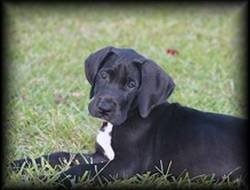
|

|
|
|
| ||
Mantle Great DaneIn her "The Case For Approving the Mantle: As Simple As Black and White" Mary Anne Zenetos presents some excellent arguments in favor of accepting the Mantle in the conformation ring from the point of view of breeding for the Harlequin pattern. Specifically, she cites the use of Mantles in Harlequin breeding to provide the clean white fronts and necks that are desirable. She observes that Harlequin pedigrees do not accurately represent the quality of breeding, because the Mantles cannot be shown, therefore quality Mantles cannot achieve an AKC championship. This, if one is merely looking at the number of finished ancestors, makes most Harlequins appear to be of lesser quality than the other accepted colors where all ancestors will have been of showable colors also. And she is correct. However. She states that Mantle x Mantle will always produce Mantle. Ms. Zanetos seems to believe that all Mantles are, in fact, sisi. If that were the case, she would be again correct. Now, in several of the herding breeds, there is ALWAYS the white pattern. The "normal" white pattern generally includes the paws, tail tip, chest, and the front of the neck. Those dogs with a full white collar are referred to as "white-factored." From the breeding records of these herding breeds, we can clearly see that the "normal white pattern" dogs are sisi. And the "white-factored" dogs are sisw. This is evidenced by the fact that white-factored X white-factored produces, on the average, 25% normal white, 50% white-factored, and 25% color-headed white (showable in collies, but not in Aussies or Shelties.) Our current Mantle standard states that "The color shall be black and white with a solid black blanket extending over the body; black skull with white muzzle; white blaze is optional; whole white collar preferred; a white chest; white on part or whole of forelegs and hind legs; white tipped black tail. A small white marking in the black blanket is acceptable, as is a break in the white collar." Now, bearing in mind that the phenotypes of various s-series genotypes tend toward a lot of overlap (i.e. an sisi dog *could* have a full collar, but it's unlikely, and an sisw dog *might* be lacking the full collar, but again, it's unlikely) what we are declaring the "ideal" Mantle is most likely to be the sisw genotype. This means that two "perfectly marked Mantles", when bred to each other, are going to produce 25% "too little white" Mantles, 50% "perfectly marked" Mantles, and 25% color-headed whites. The existence of color-headed white Danes (often mistakenly called "piebald" in Danes, although the sp piebald gene is probably *not* present in Great Danes) is proof enough that the sw allele IS indeed present in our gene pool. I would also like to touch upon the example of the Boxer. Boxers come in (in Boxer terminology) "plain" and "flashy." Basically, "plain" means "solid." And "flashy" means the same as our "Mantle." *In Boxers,* we know that the Mantle/flashy pattern is not sisi, the si allele is not present in the Boxer gene pool. All flashy Boxers are, in fact, Ssw. Meaning that flashyXflashy results in 25% plain, 50% flashy, and 25% color headed whites. Many, although not all, "white" boxers are deaf. As, up until now, there was no reason to breed Mantle X Mantle, those color headed whites turning up in Harlequin litters were assumed to be either oddly marked Harlequins, or else assumed to be double-merle whites. In fact, many of them were swsw whites. By making the breeding goal for the Mantle include the full white collar, we are, in effect, requiring that we maintain the sw allele in our gene pool, thus actually increasing the number of deaf almost-white puppies born. Table of Contents |  Click Here to Vote for My Site! Click Here to Vote for My Site!
| |
| | ||
Mantle Great Dane Beginning Welcome to the World of the Great Dane.This website strives to bring you the latest information on Great Danes. The content is updated often so make sure and bookmark this site so you can keep up to date on the information. Link To UsReturn to top The Content of this Website is intended as General Information and is NOT Professional Advice. | ||
| | ||



